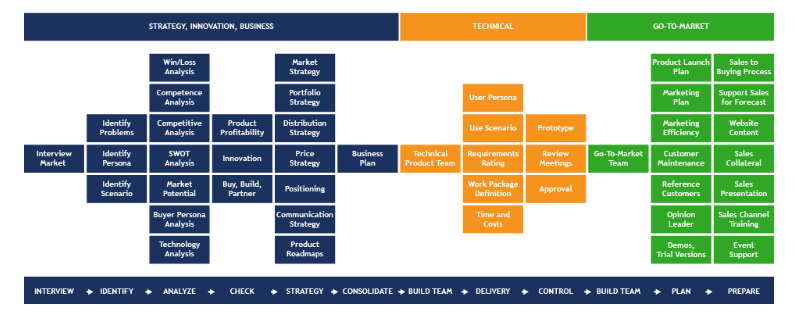The topic of product management is becoming more and more important in companies. This is why we are frequently asked the following questions:
- How is the Product Management Definition?
- Why Product Management?
- What are the Product Manager responsibilities?
In this article we deal with the definition of what product management is and want to answer the question "Why product management?".
Let's take an excursion into history for this purpose.
In 1927 the company Procter & Gamble (USA) had developed a new care product and launched it on the market. The targets for sales and market share were missed. After the internal analysis it was recognized that there were difficulties with the prioritization of the tasks and in the operational sequences as well as the inconsistent conversion of the market requirements.
It was then decided to define a person who would be responsible for obtaining and coordinating market requirements and for all further activities related to the product.
After only a short time, the success was achieved and the set goals for this product were achieved.
Due to the success, this role of product coordinator was introduced throughout the company for all products. The role of product manager was born and a first product management definition existed.
This little excursion into history already gives us a first answer to the question - Why product management?
The practical experience gained from the cooperation with the companies and from our Product Management courses provide further indications for a timely and appropriate definition. The following quotation from Peter Drucker, which is already a little older, gives further information so that we can answer the questions about product management definition and why product management.
„The aim of marketing is to know and understand the customer so well that the product or service fits him and sells itself.“
Peter Drucker
Referring to Peter Drucker's quote, I have personally observed and experienced the following over the years: there has been a change in the objectives of marketing as stated in the quote. Today, the goal that Peter Drucker describes is very often assigned to product management.
So let's briefly summarize what we have learned so far on the definition of product management:
Product management must know and understand the customer so well, that the product sells itself. It is also responsible for coordinating all other product-related activities.
Now the question arises as to which of all the activities should be coordinated by product management.
For Product Management Definition -
look at the Open Product Management Workflow™
At this point we use the Open Product Management Workflow™, which gives us an overview
of which activities are to be carried out or coordinated in which phases.
- Course: Strategic Product Management
- Course: Technical Product Management
- Course: Successful Go-to-Market

The blue part of the Open Product Management Workflow™ shows what Peter Drucker meant by the aim of marketing and product management today, i.e. customer and market expertise. Now in the orange part the production or the handover to the production and the coordination of the technical product team is added. In the green part we have the coordination of the tasks, the Go-To-Market team as well as the communication towards the customer and the measurement of the success of the measures.
Compared to classical marketing, there are additional things to do and teams to coordinate, which is why the "overview of the entire product" role has developed into product management.
So let's get back to our question about the product management definition. From the history and my personal experience the definition derived here.
4 points of Product Management Definition:
- Product management is the company's market expert:
Product management delivers the information and facts from the market, derives strategies for the product with the help of economic analyses, which are presented to the management in a decision template (business plan). - Product management delivers market requirements for production:
Requirements are generated from the market facts, evaluated in a market-oriented manner and defined for production. - Product management provides arguments for market communication:
For communication with the customer, product management provides the market fact-based arguments as well as the unique advantages resulting from the analyses. - Product management coordinates the product teams and bears the overall responsibility:
The formation and coordination of the technical product team and the Go-to-Market team is the core task of product management. If obstacles arise in the achievement of objectives, product management assumes responsibility for developing and implementing solutions with the teams.
The question: Why Product Management? can also be answered briefly as follows:
Only if someone has overall responsibility for the product, a complete overview of the market, production and market communication problems can be identified and solved together with the teams, so that in the end the product success is the result.
If you have several roles in product management, definitions can be more specific. You can read this in detail in the example job descriptions for product management because each role in product management is defined somewhat differently.
About the author
Frank Lemser is a trainer and founder of proProduktmanagement. He has been a market-driven evangelist since the beginning of the 2000s and since then has also been methodically involved with product management. He has developed the Open Product Management Workflow™, numerous tools for product managers, written and published books free of charge and was involved in the development of the Product Management Dashboard for JIRA. His personal goal is to solve many everyday and work problems for product managers, to professionalize and simplify the work for product managers.




















